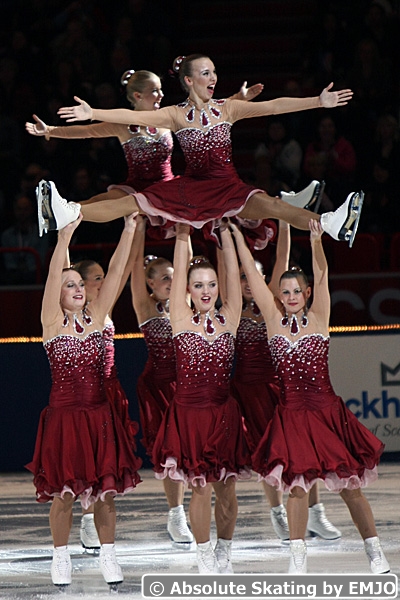Team Surprise: “Everything is different from singles' skating!” Â
July 27, 2011
By Eva Maria Jangbro (EMJO)
Photo © Eva Maria Jangbro
(EMJO)
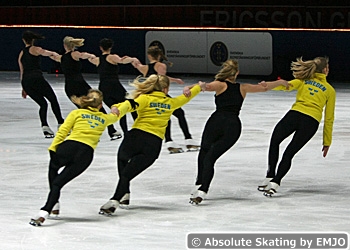 I
must admit that although Sweden has shown great results in synchronized
skating, I have not followed it as closely as the other disciplines in figure
skating. A change was needed, and what could be better than to talk to Team
Surprise, the Swedish Champions that have been World champions no less than
five times. I wanted to find out what itÂ’s like to be part of a team, how
you train in such a large group, how it is all put together, who decides
what and just about everything else I could possibly think of, since I didnÂ’t
know much.... But I learned!
I
must admit that although Sweden has shown great results in synchronized
skating, I have not followed it as closely as the other disciplines in figure
skating. A change was needed, and what could be better than to talk to Team
Surprise, the Swedish Champions that have been World champions no less than
five times. I wanted to find out what itÂ’s like to be part of a team, how
you train in such a large group, how it is all put together, who decides
what and just about everything else I could possibly think of, since I didnÂ’t
know much.... But I learned!
Synchronized skating is a fairly young sport. The first World Championships were held in 2000 and guess who won it? Team Surprise! The idea of group skating in sync came from a Dr. Richard Porter, and was originally called precision skating, due to the precise formations and timing of the group. His team, The Hockettes, performed during the intermissions of the University of MichiganÂ’s hockey teamÂ’s home games. This became very popular, especially in North America during the 1970ies, and still is. The number of skaters in a team has varied throughout the years, but is now 16. In addition 4 alternates are needed. Synchronized skating, as the other disciplines in figure skating, has a short and a free program. In the short program there are only the required elements and the free program gives a chance to show more originality and there is also group and pair lifts. However, moves such as wheel, no hold block, block and circle can only be found in synchronized skating along with the spectacular group lifts. It demands great skating skills.
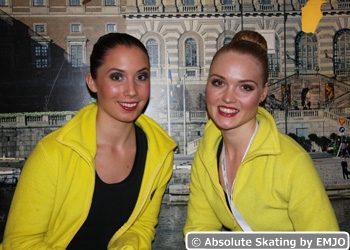 I
met up with team captains Hanna Andersson and Nanna Stranne, two of the
successful ladies of Team Surprise. They were getting ready to perform at
the Stockholm Ice show, so naturally our conversation started there.
I
met up with team captains Hanna Andersson and Nanna Stranne, two of the
successful ladies of Team Surprise. They were getting ready to perform at
the Stockholm Ice show, so naturally our conversation started there.
You did not perform in last yearÂ’s show, but this year you have two programs.
Hanna: “Last year the show was at the same time as our Worlds and therefore we did not skate. This year we were asked to do one program together with Kristoffer Berntsson for the opening of the show, and then also to perform one of our competitive programs.”
How long does it take to prepare a show program compared to a competitive program?
Hanna: “As for the free program, it takes the entire season to make it perfect. Off course the program is ready to skate for the first competition but you make little changes all the time to make it sharper and better. A show program is easier since it’s without many the technical difficulties, it’s done much faster!”
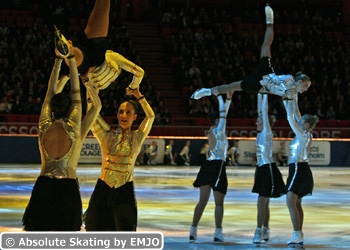 How
did you start skating, was it as a single skater?
How
did you start skating, was it as a single skater?
Nanna: ”I have skated since I was 7 and started in team skating when I was 16. In the beginning I did both single and team but now, since a year back, it’s team skating only for me.”
What are the differences?
Nanna: “Everything is different! To work in a team means a totally different focus. You have to think about each other. You have to build something together. We have a great team spirit. It is a different mentality too. As a single skater you are on your own.”
Hanna: “I am one of the few people in the group who haven’t skated singles in competition. I started in a skating school when I was 6 years old and got involved with team skating when I was 8. I cannot imagine skating alone but that’s probably because I never tried it. It is so nice to have a team around you. You share the good and the bad alike and there’s always someone there to help you handle the difficult situations.”
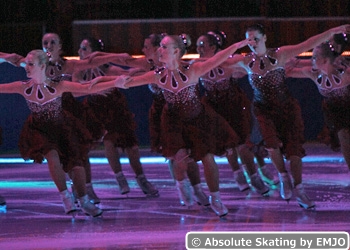 It
all seems very technically difficult to me. If one person falls, the risk
of making your partner or partners fall is great. I can understand that
the team spirit really matters and is of great importance in your development
and success. Luckily Hanna and Nanna can explain the sport well.
It
all seems very technically difficult to me. If one person falls, the risk
of making your partner or partners fall is great. I can understand that
the team spirit really matters and is of great importance in your development
and success. Luckily Hanna and Nanna can explain the sport well.
Are you involved in the process of choosing the music and putting the programs together?
Hanna: “Andrea Dohany, our coach (and also Kristoffer Berntsson’s coach), has the last word, but we all get a say and share our ideas and thoughts. Andrea wants us all to offer suggestions. If the team don’t like it, it won’t work, so we discuss it back and forth to get it right. This process usually goes really well.”
Last season, did you have many ideas to choose between and was something not chosen?
Hanna: “Last year it was a fast decision. Actually, we were already talking about a circus theme (for the free program) going home from Worlds, but we didn’t have any music yet and it was not an easy task. If you think of a theme you have to find music that matches.”
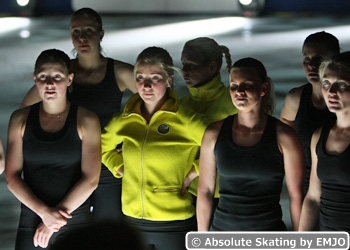 Who
cuts your music after you find it?
Who
cuts your music after you find it?
Hanna: “Kristoffer Berntsson and a guy called Magnus Hydén. Magnus helps us with the effects and has also written the first part of the circus music.”
Well, no surprise there, I kind of figured Kristoffer would be involved somehow.
Moving on to the next step; who does what and who decides how you should all look etc?
Hanna: “Well, we have different groups, like a make-up group, a dress design group (our mothers make the dresses), a hair group. There are for example 5 - 6 people doing the make-up so we’ll look unison. They come up with suggestions and then we all make the final decision on the entire look. When it comes to the costumes, Andrea is very involved with the last result. She always has an idea or a feeling for how it should look to match the program.“
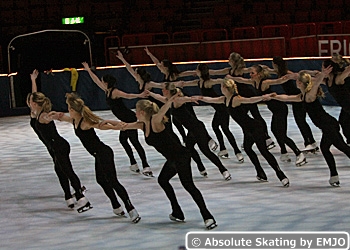 Team
Surprise has won the World championships five times so far, have you both
been part of those wins?
Team
Surprise has won the World championships five times so far, have you both
been part of those wins?
Nanna: “I have three wins and Hanna one.”
Are there many new members of the team now?
Hanna: “Well, many quit after Worlds 2005 in Gothenburg, our hometown. We have been on the podium every year except for the last two years.”
What is it that makes you such a good Team?
Hanna: “Our team differs from the other teams since we don't choose the easiest way to build the program. We want to make it on a very high technical level with a lot of speed instead of playing safe. That isn't always to our advantage since there are more risks and if someone messes up it could cost us a lot at a competition.”
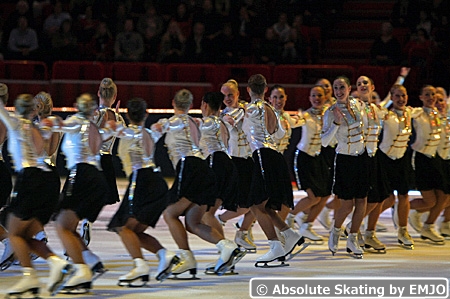
It would be interesting to watch you practice to see how you get it all together. Since there are so many of you on the ice, I can imagine it can be tricky.
Hanna: “Andrea has a lot of visions and ideas, sometimes I can't imagine how she comes up with everything. Since, as I mentioned before, we don't want to take the easy way, we have to try different things over and over to get an exciting program. A month before competitions start you might really wonder if it will look like a complete program in time. But in some way we always get it together.”
Are you all on the ice during practice or are you sometimes divided up into groups?
Hanna: “The whole team is on the ice.”
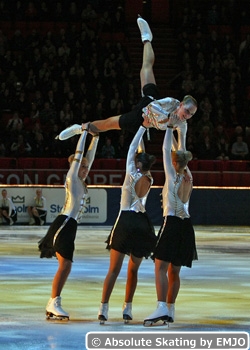 What
about when you practice a new difficult lift, how is that done?
What
about when you practice a new difficult lift, how is that done?
Hanna: “We always start to practice the lifts off-ice. When we're ready to take it on-ice, each ”lift group” starts out practicing by itself.”
What kind of off-ice training do you do?
Hanna: “Some of it we do on our own, like running and strength training. And before we go on the ice, we all get together and go through the program. Close to a competition we have more frequent off-ice practices to polish all the details. We meet with our dance coach regularly throughout the season, and we also have mental training.”
What is, in your opinion, the easiest/hardest thing about team skating?
Hanna: “The hardest thing is to have a group of 16 skaters to all perform at their best, at the same time, at a very high technical level. If one person makes a small mistake it could take time to fix it since everything is done at great speed. The easiest part is that we always have each other – in good times and bad.”
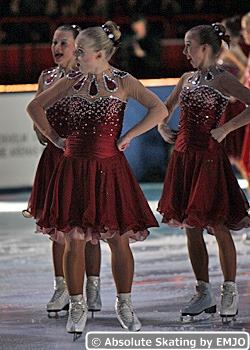 What
are your thoughts about Worlds this last year? You ended up in 4th placeÂ…
What
are your thoughts about Worlds this last year? You ended up in 4th placeÂ…
Hanna: “We were happy with our performances which was our main goal. Of course it was a bit disappointing to finish less than 1 point from the bronze medal, but that is something we can’t affect. We got lots of good, positive feedback on our programs, and it finally seems like people are noticing that we are on a higher technical level than the other teams.”
Will the team stay the same, or will there be new members next season?
Hanna: “The team is almost the same as last year, which makes it really strong. Everything is done smoother and faster and the members are already comfortable with the practice routines.”
What is the need to polish the team even more?
Hanna: “We will continue to work hard on the technical part where we want to be outstanding. Then we have to work twice as hard on the parts we’re less strong at. We are aware of where we need to improve.”
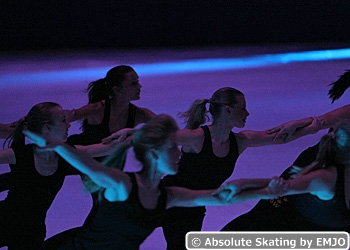 Next
year Worlds will be in Gothenburg, Sweden, again. Please share your thought
about that; what it means to you and if you feel any pressure from your
home audience??
Next
year Worlds will be in Gothenburg, Sweden, again. Please share your thought
about that; what it means to you and if you feel any pressure from your
home audience??
Hanna: “It is absolutely great that Worlds will be in Gothenburg! I think we need that pressure and we have everything to gain from it. When the home team skated at Worlds in Helsinki this year, we immediately thought that next year it’ll be our turn to skate in front of our home crowd. I believe the safety in having such support will lift us. We’re ready to take the gold back to where it belongs.”
What does the summer training look like for you? Will you stay at home or go to a camp somewhere?
Hanna: “There is no ice during July, during this time we do a lot of off-ice and dance training. In August we start again with a "mini-camp" in Gothenburg. In the autumn/winter we'll go to two more camps.”
Will you keep any of your programs for next season or are you working on new ones?
Hanna: ”There will be two new programs, we’re already on it!”
At what competitions and shows can people watch you next season?
Hanna: ”The only competitions we know about for sure at this point is Nationals and Worlds, nothing else has been decided. And there’s the sponsor show, usually held at the end of March in the Scandinavium Arena in Gothenburg. It’s mainly for our sponsors, but the public is welcome to watch.”
If you want to feel the great energy, the contagious joy and great atmosphere of synchro skating, mark your calendar for Worlds in Gothenburg, Sweden, April 13 – 14, 2012. I know I will! It will be a new challenge for my camera lens trying to catch a team of 16 skaters doing their counters and rockers, mohawks and choctaws. A totally new experience, but a fun one for sure. See you there!
